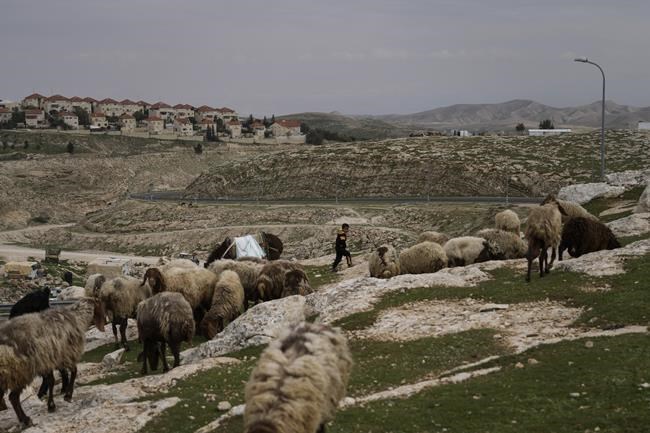JERUSALEM (AP) — Israel’s far-right government has granted approval for over 7,000 new homes in Jewish settlements in the West Bank, settlement backers and opponents said Thursday. The move defies growing international opposition to construction in the occupied territory.
The announcement came just days after the U.N. Security Council passed a statement strongly criticizing Israeli settlement construction on occupied lands claimed by the Palestinians. The United States, Israel’s closest ally, blocked what would have been an even tougher legally binding resolution, with diplomats saying they had received Israeli assurances of refraining from unilateral acts for six months.
The new approvals took place during a two-day meeting that ended Thursday and appeared to contradict those claims. The U.S. has repeatedly criticized Israeli settlement construction, saying it undermines hopes for a two-state solution with the Palestinians, but taken no action to stop it.
Peace Now, an anti-settlement watchdog group that attended the meeting, said a planning committee granted approvals for some 7,100 new housing units across the West Bank.
The group said the committee scheduled a meeting next month to discuss plans to develop a strategic area east of Jerusalem known as E1. The U.S. in the past has blocked the project, which would largely bisect the West Bank and which critics say would make it impossible to establish a viable Palestinian state alongside Israel.
Lior Amihai, the group's incoming director, said some 5,200 housing units were in the early stages of planning, while the remainder were approved for near-term construction. He also said construction was approved in four unauthorized outposts.
Earlier this week, Prime Minister Benjamin Netanyahu’s office said he had pledged not to legalize any more wildcat outposts. He made the promise after retroactively legalizing 10 existing outposts earlier this month.
The Israeli government is “spitting on the face of the U.S., only a few days after announcing that they committed to them that there would be no advancement of settlements in the near future,” said Peace Now.
Nabil Shaath, a senior Palestinian official, appealed to the United States to intervene. “The American side is required to stop this violation, which will not lead to any peace or stability in the region,” he said.
There was no immediate U.S. reaction.
The planned construction is likely to add to the already heightened tensions following an Israeli military raid that killed 10 Palestinians in the West Bank city of Nablus on Wednesday.
The international community, along with the Palestinians, considers settlement construction illegal or illegitimate and an obstacle to peace. Over 700,000 Israelis now live in the occupied West Bank and east Jerusalem — territories captured by Israel in 1967 and sought by the Palestinians for a future independent state.
Netanyahu’s new coalition, which took office in late December, is dominated by religious and ultranationalist politicians with close ties to the settlement movement. Finance Minister Bezalel Smotrich, a firebrand settler leader, on Thursday was officially granted Cabinet-level authority over settlement policies.
Smotrich had promised earlier this month a major settlement push. His office declined to comment Thursday, but settler representatives, who also attended the planning meeting, celebrated what they said were new approvals.
Yossi Dagan, a settler leader in the northern West Bank, welcomed the retroactive approval of 118 homes in “Nofei Nehemia,” an outpost in the northern West Bank, after a 20-year struggle. “Great news for Samaria, for settlement and for the entire nation of Israel,” he said, using the biblical name for the region.
Shlomo Neeman, chairman of the Yesha settler’s council, declared the approvals “a tremendous boost.” Neeman is also mayor of the “Gush Etzion” settlement bloc near Jerusalem, where settlers said hundreds of new homes were approved.
The decision marks one of the largest approvals of settlement construction in years. In comparison, some 8,000 units were approved in the previous two years, according to Peace Now.
“It's very big,” said Amihai.
Josef Federman, The Associated Press



